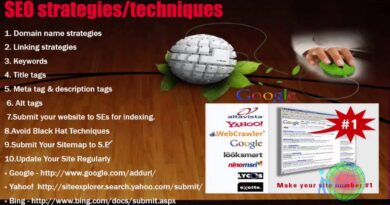RANK NO1 ON SERP: Advance Search Engine Optimization ( an introduction from basic level to high level)
Absolutely! Here’s a powerful and structured introduction to Advanced Search Engine Optimization (SEO) designed to help your content Rank #1 on SERP (Search Engine Results Page), taking you from basic to advanced level.
Contents
🔝 RANK #1 ON SERP: Advanced SEO – From Basic to Pro (Complete Introduction)
🎯 What Is SEO?
SEO (Search Engine Optimization) is the technique of optimizing your website or content so that it appears higher in search engine results like Google, Bing, or Yahoo—organically (not paid).
📘 SECTION 1: SEO BASICS (FOUNDATION)
🔹 1.1 Keywords & Search Intent
-
Use Keyword Research Tools: Google Keyword Planner, Ubersuggest, SEMrush
-
Focus on Search Intent: Informational, Navigational, Transactional
-
Long-tail keywords perform better initially
🔹 1.2 On-Page SEO
-
Use keywords in:
-
Title Tag
-
Meta Description
-
H1-H6 Headings
-
URL
-
First 100 words
-
-
Optimize images (ALT tags, file names)
🔹 1.3 Technical SEO
-
Mobile-Friendly
-
Fast Loading Speed (Core Web Vitals)
-
HTTPS Security
-
Proper URL Structure
-
XML Sitemap and Robots.txt
🚀 SECTION 2: INTERMEDIATE SEO STRATEGIES
🔸 2.1 Content Optimization
-
Follow E-E-A-T (Experience, Expertise, Authoritativeness, Trustworthiness)
-
Internal Linking (connect to relevant posts/pages)
-
Avoid duplicate content (use canonical tags)
-
Update old content regularly
🔸 2.2 Link Building
-
Guest Posting
-
Backlink Outreach
-
Broken Link Building
-
Skyscraper Technique (create better content than existing top pages)
🔸 2.3 Local SEO
-
Set up Google Business Profile
-
Consistent NAP (Name, Address, Phone Number)
-
Get reviews on local directories
-
Use location-specific keywords
🧠 SECTION 3: ADVANCED SEO TECHNIQUES
🔹 3.1 Semantic SEO & Topic Clusters
-
Use LSI keywords (Latent Semantic Indexing)
-
Create pillar content and link related subtopics
🔹 3.2 Schema Markup / Structured Data
-
Add Rich Snippets with schema.org (like FAQ, Review, Article, Product)
-
Helps Google better understand your content
🔹 3.3 User Experience (UX) Signals
-
Reduce Bounce Rate
-
Improve CTR (Click-Through Rate)
-
Increase Average Time on Page
🔹 3.4 AI & Voice Search Optimization
-
Write content in natural language
-
Use questions (who, what, how, etc.)
-
Optimize for mobile and featured snippets
🔹 3.5 Core Web Vitals
-
Largest Contentful Paint (LCP)
-
First Input Delay (FID)
-
Cumulative Layout Shift (CLS)
📊 SECTION 4: SEO TOOLS YOU MUST MASTER
| Tool | Purpose |
|---|---|
| Google Search Console | Monitor site performance |
| Google Analytics 4 | Track user behavior |
| Ahrefs / SEMrush | Keyword + backlink analysis |
| Screaming Frog | Technical site audit |
| PageSpeed Insights | Speed & core web vitals |
🏆 HOW TO RANK #1 ON GOOGLE
✅ Step-by-Step Strategy:
-
Choose the right keyword (with low KD & high intent)
-
Create high-quality, in-depth content (1000+ words)
-
Optimize page speed and mobile-friendliness
-
Use internal and external links
-
Get quality backlinks
-
Use schema markup
-
Improve user engagement (CTR, bounce rate)
-
Regularly update and repurpose content
💡 Pro Tip:
“Don’t write content for Google, write it for users — but structure it so Google can understand it.”
Would you like:
-
A downloadable PDF guide of this SEO plan?
-
A checklist for SEO beginners and professionals?
-
A customized SEO strategy for your blog/website?
Let me know, and I’ll build it for you!


